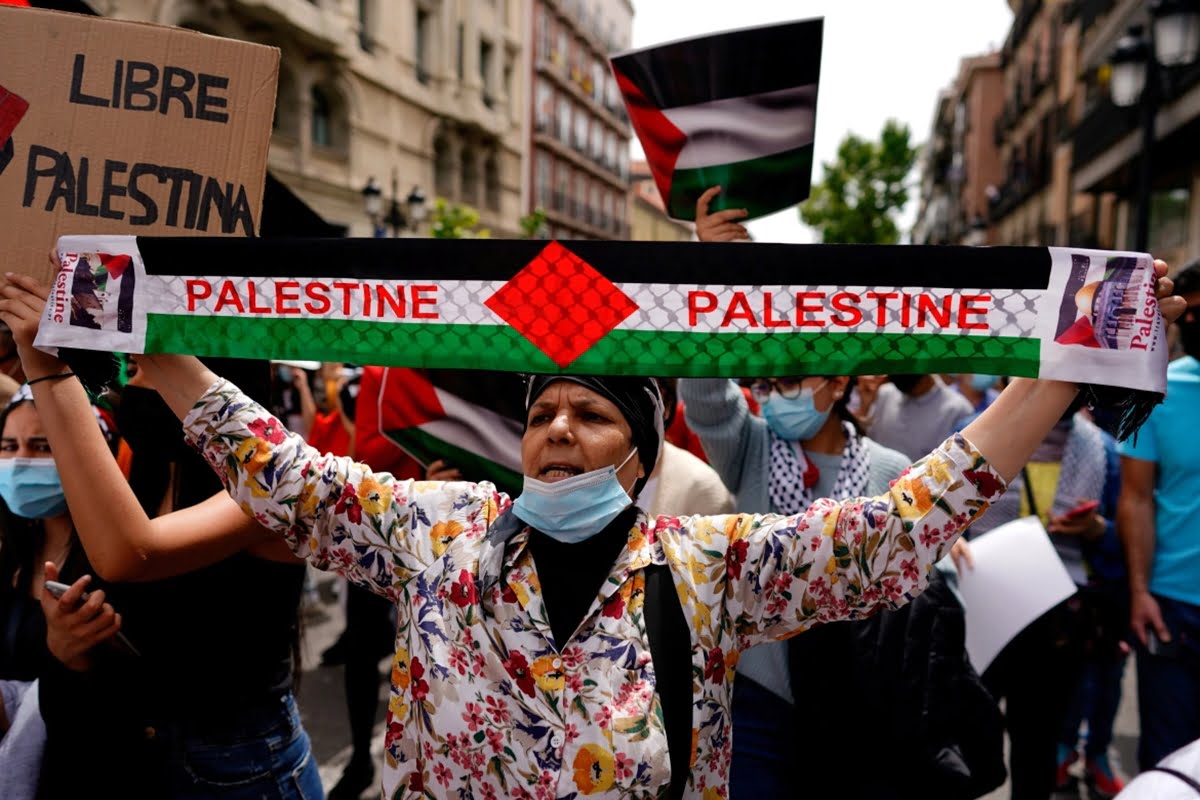“There is absolutely no reason to believe that history will repeat itself. Not unless it is made to. Not unless people actively work to create such a cataclysm.”
Arundhati Roy, Kashmir: The Case for Freedom
Occupation in Palestine and Kashmir
Independence from British colonial rule partitioned the subcontinent into India and Pakistan on politico-religious dimensions. Yet a majority of Kashmiris preferred to remain independent. Communal violence, which continues to characterise the Partition even in contemporary popular imagination, successfully built an armed revolt in the name of Azad Kashmir Regular Forces. A part of the region that was thus liberated in spite of the Dogra king’s resistance was declared as Azad Kashmir on October 24, 1947. Communal attacks followed soon after, which, according to Alistair Lamb, were essentially a part of the Dogra-endorsed pogrom that sanctioned the ethnic cleansing of roughly 200,000 Kashmiri Muslims.
The Indian state, particularly the current central government, continues to victimise Kashmiri Hindus by reiterating the exodus in the 1990s, which witnessed the mass migration of over 90,000 Pandits due to Muslim insurgency. Popular tendency to label the exodus as a “genocide” is, as Mridu Rai points out, a mischaracterisation of history. By exploiting the aggressive rhetoric of Hindu nationalism, political leaders such as Modi have not only appropriated Kashmiri people’s memory, but also fuelled communal narratives to strengthen Islamophobia. The ramifications of such actions are most evident in Kashmir, where, as Ather Zia demonstrates, the events of 1984 created a mutual otherness among Hindus, Kashmiris, and Sikhs.
Also read: On Kashmir’s Occupation, Handwara Killings and Updates
The Zionist ambition that enabled Israeli occupation was relatively more organised. Born in the last decades of the nineteenth century, Theodor Herzl’s political Zionist movement emerged out of the supposed necessity of creating a Jewish state. While the French Revolution had enabled Jews in Western Europe to gain civil rights, political emancipation for the Jewish population did not take place in Eastern Europe. Anti-semitism vehemently resurged in the 1880s across all countries in Europe, which triggered the ‘need’ for Zionism, whose colonising tendencies received support for the construction and development of its colonial project. For instance, despite their anti-semitic rhetoric, the British ruling class offered military training and weaponry to Zionist leaders in an attempt to quench the anti-colonial nationalism of the Arabs in the Middle East, which posed an obstacle to British domination at the time. Israel was also backed by the United States, which in 2017 shifted its embassy from Tel Aviv to the disputed area of Jerusalem as another signifier of support.
The Nakba, translated loosely as ‘catastrophe,’ constitutes one of the most significant aspects of Palestinian history. In 1948, Jewish militia groups conducted raids, organised massacres, and contributed to depopulation campaigns across Palestine.
Israel’s refutation of Palestine’s common historical memory continues to the present day as part of its development of state identity. The Nakba, translated loosely as ‘catastrophe,’ constitutes one of the most significant aspects of Palestinian history. In 1948, Jewish militia groups conducted raids, organised massacres, and contributed to depopulation campaigns across Palestine. Over 400 villages were completely destroyed. But the Palestinians are deprived of their right to remember their painful past since the Nakba law in Israel authorises the retraction of government funding to institutions and organisations that endeavour to stage a public mourning of the Nakba. Considering the extent of violence sanctioned by the Zionist leadership, it is evident why Israel aims to erase this historical reality. Meanwhile, Israeli commemoration of the Holocaust on the Holocaust Memorial Day and Yom HaShoah is identified as an event of national significance.
Intervention and Failure of the United Nations
After 1954, the United Nations deployed a military observer group in India and Pakistan to monitor the region. The “political wound” of Kashmir, as Ather Zia points out, requires an internationally determined plebiscite, for which Kashmiris have been fighting since decades. The demonstrations in front of the UN office in Srinagar have, however, not produced concrete results. India’s recent abrogation of Article 370 and its subsequent consolidation of Kashmir have further added to the region’s precarity.
In 1947, the United Nations proposed the UN Partition Plan, which still appeals to several stakeholders for the resolution of the Israeli-Palestine “conflict.” The Arabs remain opposed to the proposal because of its violation of the principles of national self-determination. The failure of United Nations in both scenarios has prolonged colonial occupation in Kashmir as well as Palestine.
The socio-historical evidence pertaining to Palestine is under greater threat in contemporary times considering the increasing support being provided to Israeli authorities.
Make no mistake: Kashmir and Palestine are occupied by colonisers. The mainstream narrative of projecting colonial occupation as a “conflict” serves only the oppressors. Several historical manuscripts can testify to the reality of occupation in Kashmir in spite of the Indian state’s denial. The socio-historical evidence pertaining to Palestine is under greater threat in contemporary times considering the increasing support being provided to Israeli authorities, which is why it is worth quoting at length Israel’s defence minister Moshe Dayan’s speech to students in 1969:
“We came here to a country that was populated by Arabs, and we are building here a Hebrew, Jewish state. Instead of Arab villages, Jewish villages were established. You do not even know the names of these villages and I do not blame you, because these geography books no longer exist. Not only the books, but all the villages do not exist…There is not a single Jewish settlement not established in the place of a former Arab village.”
Also read: “Dear Indian Feminists, Kashmir Is Occupied. Period”: Essar Batool
Justification of State Action
The narrative of state occupation has completely changed since the abrogation of Article 370 in Kashmir. Thus, understanding the state’s justification of the abrogation is particularly relevant. In Unbreaking India, Sanjay Dixit, an Indian civil servant, explains the “brilliant legal strategy” that apparently sanctions the nullification of Article 370 comprises of the 2019 Presidential order, 1965 Presidential order, and the amendment in Article 367 in 1965. Dixit gives “full points to the Government of India” and justifies state action on the basis of the country’s resistance to separatist sentiments and gender discrimination in Kashmir. What this suggests is that the state has mobilised the false narrative of ‘saving Kashmiri women from Kashmiri men’ under the pretence of feminist activism. This is why Dixit considers that the impact of nullification on “deprived people” has been “salutary.”
Zionist leadership in Israel justifies its atrocities on Palestinians by invoking the ramifications of the Holocaust on the Jewish population. But it is worth noting that Zionism’s claim of protecting Jews is a survival strategy to ensure its colonial enterprise: it was never intended to aid Jews. Herzl had accepted the Jewish communities as an economic burden on the society: “We are naturally drawn into those places where we are not persecuted and our appearance there gives rise to persecution.” Moreover, Tom Segev writes that Zionist officials preferred “healthy young Zionists” to refugees from Hitler’s Germany. This dismantles Israel’s self-proclaimed reputation as a demographical and cultural refuge for Jews across the world.
When Kashmiri or Palestinian scholars challenge the veracity of the state narrative of India or Israel, their works are delegitimised because of their attachment to the subject matter. Continual opposition to academic discourses and articulations of oral narratives of colonised Kashmiris and Palestinians perpetuates their epistemic oppression in mainstream society. The totality of such ontological intersections in the colonial occupation maintained by the Indian and the Israeli state showcases the pervasiveness of Islamophobia, which must be challenged by anti-colonial aspirations for azadi.
Azadi is not a ‘conspiracy theory’: it is a decolonial necessity to fight against state domination and ethnic cleansing in Kashmir and Palestine.
Featured image source: AlJazeera
About the author(s)
Mridula Sharma is a researcher and a writer. Her work lies in the intersection of feminist theory, postcolonial studies, and popular culture.






Colonial occupation of Kashmir? The main aim of colonialism is to gain recources, supress the local population by bringing in setellers, none of which happened in Kashmir; It is a legal part of india as the maharaja aceeded to india and signed the same document that 500+ states signed, you can even make the claim that Hyderabad Deccan is under occupation because we conquered it but you can’t make the same argument for kashmir. And when it comes to Israel it’s occupation of Palestine is more legitimate than USA’s occupation of Hawaii and China’s occupation of Tibet, They had got a small slicer of land which was not acceptable by the Arab states so they attacked Israel and lost. As simple as that. And this is all before the Geneva convention, thus you can’t call it an illegitimate or illegal state.
The Muslim killings was done by the then independant Kashmir’s Dogra king, not by the state of India, the kashmiri pandit exodus (200,000 displaced not 90,000) was done under the noses of the Indian state and nothing was done to stop it. Try and use your brain at least occasionally.
Wow so Pakistani Occupied Kahsmir is “liberated” but Indian kashmir (Which is a legal part of india throufh the instrument of acession) is not? God save your logic. Only he knows who gave you your degree. Plus India has spent more on the welfare of Kashmir than on bihar, for context Bihar has 5 times the population of Kashmir, there are Kashmiris that own properties in Delhi. And it was a brilliant move by the centre to remove article 370, as it was an apartheid act that discriminated against minorities, Dalits, LGBTQIA+ community and women in Kahsmir.
@Blue: Clearly you seem to have no understanding of the sociopolitical reality. I see that most of your objections are directed to my analysis of state oppression in Kashmir. I’d like to recommend the works of Ather Zia, Essar Batool, and Sumantra Bose for your reference. Feel free to read other books that have been cited in this article. In case you don’t know what colonialism means, please read MAR Habib’s “Modern Literary Criticism and Theory: A History.” Habib mentions Kashmir’s “colonial struggle” on page 738 (publisher – Blackwell Publishing). To know the reality of the so-called “legitimate” occupation of Palestine, I’d suggest you read “Palestine: A Socialist Introduction.” Also, I am not calling POK as Azad Kashmir: the name already exists. But well, how would you know that unless you read? You can continue sharing your stubborn and uninformed personal opinions here, but saying “wow” and invoking your God will not translate your fiction into truth. Don’t embarrass yourself before reading anything worthwhile.
Embarrassing myself? You side has embarrassed itself by mislabeling the situation in Kashmir as “colonialism” and “occupation”, by you throwing out labels and using these word salads no constructive argument is made. Kashmir is a legal part of India and isn’t a colony/occupied land.
Deadly intersectionality- LGBT community matching for papestine with rainbow flags alongside people who would throw them from roofs in a perfect islamic state. Plus I’m an atheist the invoking God was a metaphor.
@Mridula Again an occupation is always illegal in this case you can’t term it as an “occupation”, kashmir isn’t occupied, and kashmir is more of a liability than an asset to India we spend billions of dollars just in the security of the state and provide government job to kashmiris, Palestinians aren’t provided government jobs. Plus when it comes to israel, it is a legitimate state and recognized by the UN and has a right to exist.
“Occupied By colonizers” Again, with Palestinians you can draw that conoarison but not with kahshmir, how many indians that are not native to kashmir have setteled in Kashmir eh? What resouce extraction is India carrying out in Kashmir? I agree that Kashmir has suffered a lot and some war crimes have been committed to but to call it colonialism and occupation is going too far.